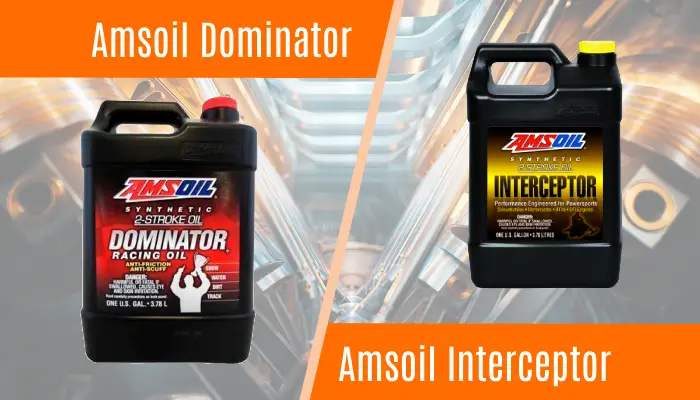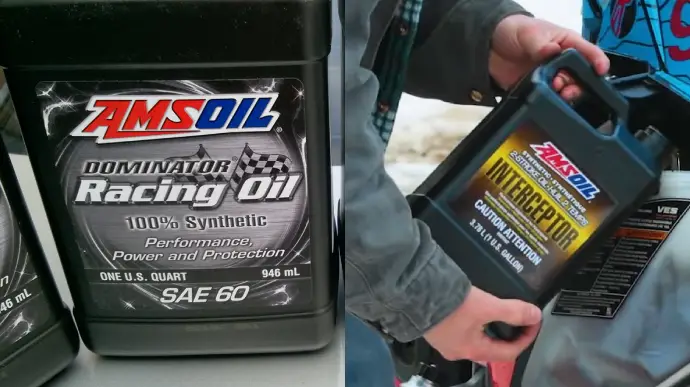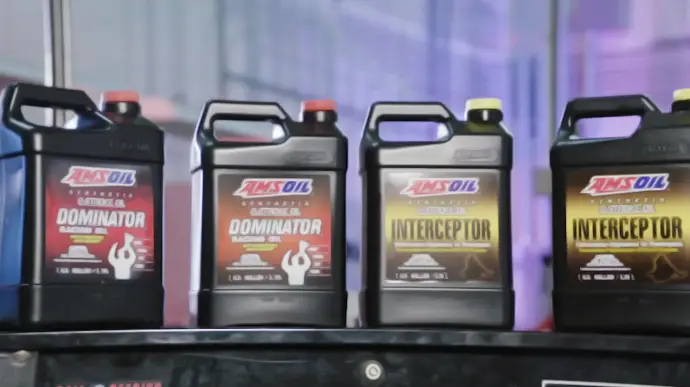Physical Address
304 North Cardinal St.
Dorchester Center, MA 02124
Physical Address
304 North Cardinal St.
Dorchester Center, MA 02124

Amsoil’s Dominator and Interceptor oils are two popular options for two-stroke engine lubrication, but they are not created equal. Understanding the differences between the Dominator and Interceptor oil can significantly impact your engine’s longevity and performance.
In terms of engine compatibility and intended use, Amsoil Dominator and Interceptor oils differ significantly.
Dominator is engineered for racing and highly modified engines, making it compatible with a wide range of fuels, including leaded and unleaded gasoline, diesel, alcohol, nitromethane, and nitrous oxide.
On the other hand, Interceptor is a versatile choice suitable for recreational applications like snowmobiles, motorcycles, and personal watercraft.
We’ll explore all the differences between Amsoil’s Dominator and Interceptor oils and let you know which is the best choice for your specific engine needs.

When comparing Amsoil Dominator and Amsoil Interceptor oil, there are several key differences to consider.
To determine which Amsoil oil is right for your engine, consider the engine compatibility and intended use of both Amsoil Dominator and Amsoil Interceptor oil.
Amsoil Dominator oil is designed exclusively for racing or highly modified engines with extreme RPM and operating temperatures.
It’s compatible with various fuels, such as leaded and unleaded gasoline, diesel, alcohol, nitromethane, and nitrous oxide, making it suitable for racing applications with varying fuel types.
On the other hand, Amsoil Interceptor oil is compatible with most conventional and synthetic two-stroke oils, providing versatility for recreational applications using different oil types.
While it’s geared towards high-performance engines, it’s also suitable for recreational applications like snowmobiles, personal watercraft, and motorcycles.
Another area where Amsoil Dominator and Amsoil Interceptor oil differ is in their API and JASO specifications.
Dominator meets both the API TC and JASO FC specifications, denoting oils designed for two-stroke engines with high-performance requirements and formulated for two-stroke engines used in motorcycles.
Conversely, Interceptor meets the API TC specification, which is designed for two-stroke engines with moderate performance requirements. This means that while Interceptor is still a high-performance oil, it may not be optimal for engines that require the extreme performance capabilities of Dominator.
Amsoil Interceptor contains more detergents and additives specifically designed to prevent harmful deposits and ensure a cleaner engine. The detergents in Amsoil Interceptor oil work to dissolve and remove carbon, varnish, and other deposits that can accumulate in the engine.
By doing so, it helps to keep the engine parts clean and functioning optimally. This is particularly important in high-performance engines that may experience extreme operating conditions and higher levels of deposit formation.
In contrast, the emphasis of the Amsoil Dominator is on providing superior protection against wear and extending the life of engine components rather than actively cleaning the engine. While it still offers some level of cleanliness, it may not be as effective as Amsoil Interceptor in this regard.
Therefore, if engine cleanliness is a top priority for you, Amsoil Interceptor oil is the recommended choice. Its enhanced detergents and additives ensure that your engine stays clean and performs at its best.
When using Amsoil Dominator or Amsoil Interceptor oil, you may experience differences in power valve sticking. Power valve sticking occurs when carbon buildup prevents the valve from opening and closing properly, leading to decreased engine performance.
While both oils are designed to minimize carbon buildup, there are some distinctions in their effectiveness. Amsoil Interceptor oil is specifically formulated to prevent carbon buildup on variable exhaust power valves.
Its advanced formulation ensures that the valves remain clean and operate smoothly, optimizing engine performance.
On the other hand, while Amsoil Dominator oil provides excellent engine cleanliness, it may not guard against power valve sticking as effectively as Interceptor.
Therefore, if you’re concerned about power valve sticking, choosing Amsoil Interceptor oil is recommended for superior protection and performance.
Amsoil Dominator oil isn’t recommended for engines that can adjust the fuel/oil ratio on the fly. This is because Dominator oil is formulated with a fixed ratio of oil to fuel and doesn’t have the flexibility to adapt to changing ratios.
Contrary to this, Amsoil Interceptor oil is designed for engines that can modify the fuel/oil ratio during operation. Interceptor oil provides excellent lubrication at varying fuel/oil ratios, allowing the engine to optimize performance based on its specific needs.
This makes Interceptor oil the preferred choice for engines that require fuel/oil ratio adjustments while in use.
Dominator oil is available in various viscosities, such as 5W-20, 10W-30, 10W-40, 15W-50, and SAE 60, providing flexibility for different racing engine requirements.
The viscosity index of the Dominator varies between viscosities but falls within the range of 156 to 174, ensuring stable viscosity with temperature fluctuations.
Conversely, Interceptor oil maintains a consistent viscosity of 30.7 centistokes (cSt) at 40°C and 6.5 cSt at 100°C. This consistent viscosity offers stable performance across a broad range of power sports applications.
Additionally, the viscosity index of the Interceptor remains high at 172, indicating excellent viscosity stability across temperature changes.
These differences in viscosity make Dominator and Interceptor oils suitable for different engine types and operating conditions.
Amsoil Dominator oil offers viscosities with lower pour points, as low as -48°C or -54°F. This is particularly advantageous for startup protection in cold conditions.
Meanwhile, Amsoil Interceptor oil boasts an exceptionally low pour point at -53°C or -63°F, making it highly suitable for extreme cold-weather applications.
Both oils demonstrate impressive abilities to handle frigid temperatures, ensuring reliable lubrication and protection in cold environments.
However, the slightly lower pour point of Amsoil Interceptor oil may provide an extra edge when it comes to extreme cold conditions.
Consider your specific requirements and the temperature range you’ll be operating in when choosing between these two oils.
In terms of cost, Amsoil Dominator is priced at $17.89 per quart, making it a more premium option. This higher price point aligns with Dominator’s focus on racing and high-performance applications, where the utmost quality and performance are paramount.
On the other hand, Amsoil Interceptor offers a slightly more budget-friendly option at $16.19 per quart. This makes it a cost-effective choice for recreational users who still want high-quality oil without compromising on performance.
While both oils offer excellent value for their respective applications, Dominator may be the preferred choice for those seeking top-tier performance, while Interceptor provides a great balance of quality and affordability.
| Characteristic | Amsoil Dominator | Amsoil Interceptor |
| Engine Compatibility and Intended Use | Racing and highly modified engines with various fuel compatibility | Versatile for recreational applications, including snowmobiles, motorcycles, and personal watercraft |
| API and JASO Specifications | API TC and JASO FC | API TC |
| Engine Cleanliness | Emphasis on wear protection, less effective in maintaining cleanliness | Contains more detergents and additives for a cleaner engine |
| Power Valve Sticking | Might not keep power valves from sticking as well | Prevents carbon buildup on variable exhaust power valves |
| Fuel/Oil Ratio Adjustments | Not ideal for engines that can adjust fuel/oil ratio on the fly | Suitable for engines that can modify the ratio during operation |
| Viscosity | Available in various viscosities, viscosity index varies, stable with temperature fluctuations | Consistent viscosity at 40°C and 100°C, high viscosity index for stable performance across temperature changes |
| Cold-Weather Performance | Some viscosities have low pour points, beneficial for cold startups | Exceptionally low pour point, suitable for extreme cold-weather applications |
| Cost and Value | Priced at $17.89 per quart, more premium product for racing | Slightly more budget-friendly at $16.19 per quart for recreational use |

While the Amsoil Dominator and Amsoil Interceptor are specifically formulated for two-stroke engines, they shouldn’t be used in 4-stroke engines to prevent engine damage and ensure optimal performance.
Two-stroke engines require a different type of oil than four due to their unique design and operating mechanisms. Using the Amsoil Dominator or Amsoil Interceptor in a four-stroke engine can lead to inadequate lubrication and increased wear on engine components.
Four-stroke engines rely on engine oils with specific additives and viscosity levels to provide proper lubrication, cooling, and protection against friction and wear. Using the incorrect oil type can reduce engine performance, increased heat generation, and potential engine failure.
Always refer to the manufacturer’s recommendations to select the appropriate oil for your four-stroke engine to maintain its longevity and optimize its performance.
Switching between the Amsoil Dominator and Interceptor in the same engine without experiencing any problems is feasible, as both oils are compatible. But it’s crucial to consider the specific needs of your engine.
Amsoil Dominator is formulated for racing and highly modified engines, prioritizing wear protection and power. On the other hand, the Amsoil Interceptor focuses on engine cleanliness and wear protection in recreational applications.
While both oils can be used interchangeably, choosing the oil that best suits your engine’s requirements and intended use is recommended. Consistency in oil choice is more likely to provide optimal performance and protection.
Therefore, evaluating your engine’s needs and selecting the appropriate oil is important to ensure the best results.
Regarding the differences between Amsoil Dominator and Amsoil Interceptor oil, it’s important to consider their specific applications and the unique needs of your engine.
Dominator is tailored for racing and high-performance engines, offering superior wear protection and power optimization. In contrast, Interceptor maintains engine cleanliness and prevents harmful deposits, making it ideal for recreational applications.
Both oils can be used interchangeably, but selecting the one that aligns with your engine’s requirements is crucial for optimal performance and longevity. So, whether you’re chasing the checkered flag on the racetrack or enjoying a leisurely ride, choosing the right oil ensures your engine operates at its best.
Last update on 2026-02-26 / Affiliate links / Images from Amazon Product Advertising API